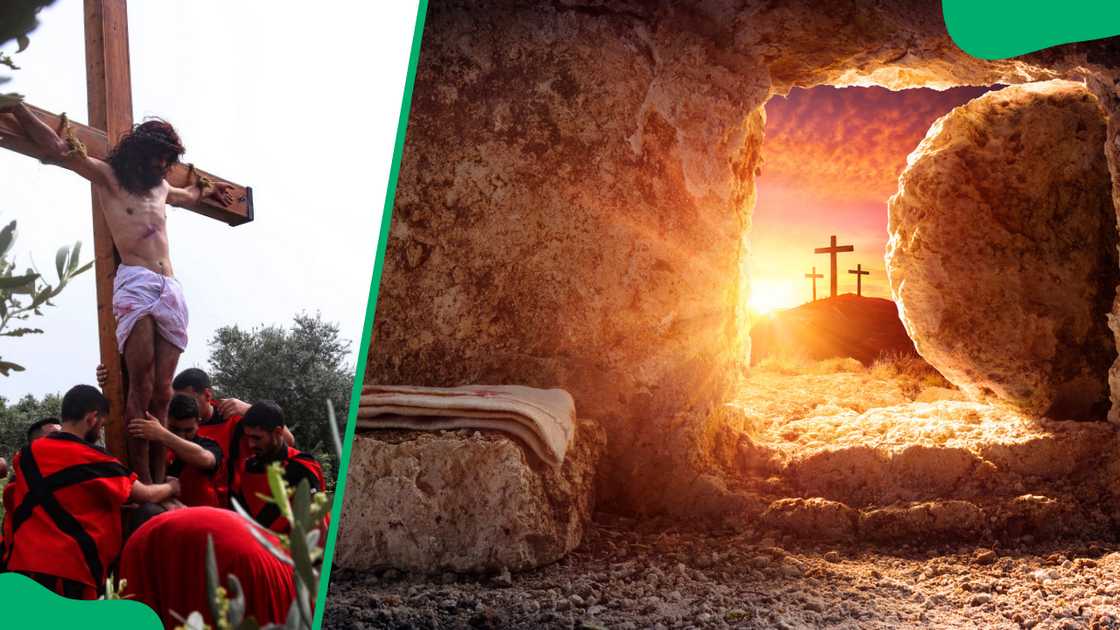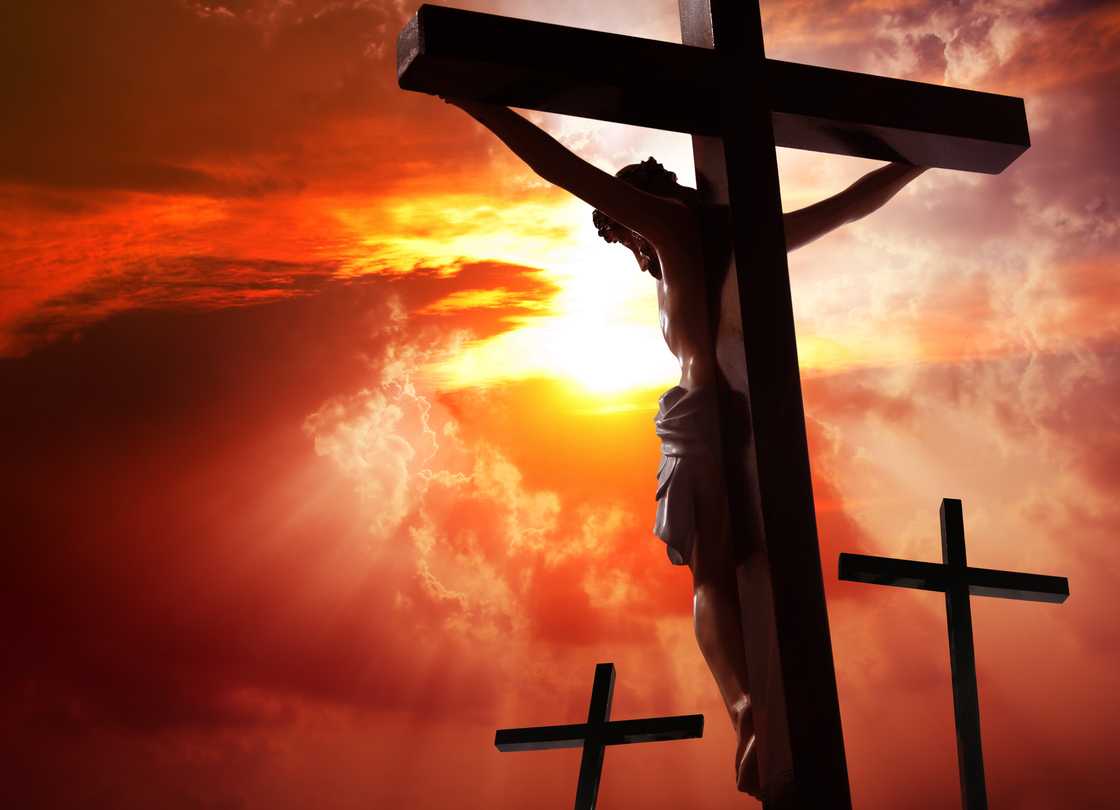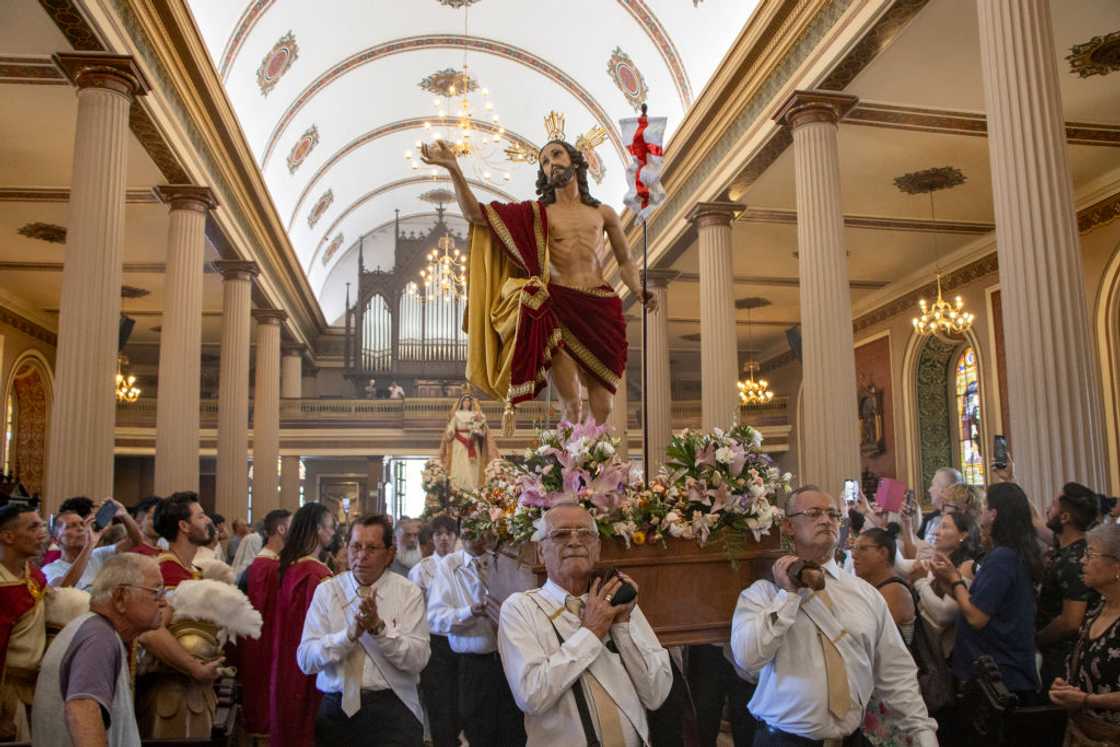Is Easter in the Bible? Bible verses that mention and reference Easter
The celebration of Easter revolves around the resurrection of Jesus Christ, one of the most significant events in Christianity. While modern traditions include sunrise services and festive gatherings, many wonder if Easter is explicitly mentioned in the Bible. Verses that reference Easter can offer a deeper understanding of this significant Christian observance.

Source: Getty Images
TABLE OF CONTENTS
Easter is celebrated on the first Sunday following the first full moon after the spring equinox. This means Easter can fall between 22 March and 25 April. Every vibrant tradition, from egg hunts to church services done on Easter, brings communities together. This celebration connects ancient beliefs with modern expressions of faith.
Is Easter in the Bible?
The word "Easter" appears only once in the King James Bible, in Acts 12:4, where it states:
And when he had apprehended him, he put him in prison, and delivered him to four quaternions of soldiers to keep him; intending after Easter to bring him forth to the people.

Read also
Prophet who predicted Trump's assassination attempt shares fresh warning amid new leadership in US
Here, King Herod Agrippa I had arrested Peter after killing James, John's brother. However, biblical scholars widely agree that "Easter" in this context is a mistranslation. The original Greek term, "Pascha," refers to Passover, a Jewish festival commemorating the Israelites' liberation from Egypt.
Other translations, such as the NIV and ESV, render the term "Passover" aligning with its original meaning. Thus, the term "Easter" in this verse does not reference Christ's resurrection or the holiday Christians observe today.
Where in the Bible does it tell the Easter story?
The story of Easter unfolds across the New Testament, particularly in the Gospels of Matthew, Mark, Luke, and John. So, where does the Bible mention Easter? These accounts describe Jesus' triumphal entry into Jerusalem, betrayal, crucifixion, and resurrection.
1. The triumphal entry into Jerusalem
Verses: Matthew 21:1–11, Mark 11:1–11, Luke 19:28–44, John 12:12–19
The Easter story begins with Jesus riding into Jerusalem on a donkey, fulfilling Old Testament prophecy (Zechariah 9:9). Crowds welcomed Him, shouting “Hosanna!” and laying palm branches on His path. This moment symbolised the arrival of the Messiah and set the stage for the events to come.
2. The Last Supper
Verses: Matthew 26:17–30, Mark 14:12–26, Luke 22:7–23, John 13:1–30
The evening before His crucifixion, Jesus shared the Passover celebration meal with His disciples. During this supper, He instituted the Lord’s Supper (or Communion), saying, “This is my body” and “This is my blood,” signifying the new covenant between God and humanity. John’s Gospel uniquely focuses on Jesus washing the disciples’ feet, emphasising humility and service.
3. Jesus prays in the garden of Gethsemane
Verses: Matthew 26:36–46, Mark 14:32–42, Luke 22:39–46
After the meal, Jesus went to the Garden of Gethsemane to pray. Overwhelmed with sorrow, He pleaded with God to take away the "cup" of suffering but ultimately submitted to God’s will. This scene demonstrates Jesus’ humanity and obedience to His divine mission.
4. The arrest and trial of Jesus
Verses: Matthew 26:47–68, Mark 14:43–65, Luke 22:47–71, John 18:1–27
Judas Iscariot, one of Jesus’ disciples, betrayed Him with a kiss. Jesus was arrested and taken before the Sanhedrin, the Jewish council, where He was falsely accused of blasphemy. The trial was marked by mockery and physical abuse.
5. The crucifixion of Jesus

Source: Getty Images
Verses: Matthew 27:27–56, Mark 15:16–41, Luke 23:26–49, John 19:16–37
After being sentenced by Pontius Pilate, Jesus Christ endured brutal flogging and carried His cross to Golgotha. He was crucified between two criminals, and as He hung on the cross, He prayed, “Father, forgive them, for they do not know what they are doing” (Luke 23:34). Darkness covered the land, and with His final breath, Jesus declared, “It is finished” (John 19:30).
6. The burial of Jesus
Verses: Matthew 27:57–61, Mark 15:42–47, Luke 23:50–56, John 19:38–42
Joseph of Arimathea, a secret follower of Jesus, requested His body from Pilate. Joseph and Nicodemus wrapped Jesus’ body in linen and placed it in a tomb carved out of rock. A large stone sealed the entrance.
7. The resurrection of Jesus

Read also
Video as Bishop TD Jakes suffers medical emergency during live service trends, Daddy Freeze reacts
Books: Matthew 28:1–10, Mark 16:1–8, Luke 24:1–12, John 20:1–18
On the third day, women who visited the tomb found it empty. Angels informed them that Jesus had risen, just as He had foretold. Mary Magdalene was the first to see the risen Jesus, and He instructed her to tell His disciples. This moment marked the victory over sin and death, forming the cornerstone of Christian belief.
What does the Bible say about Easter?
While the Bible does not explicitly command the celebration of Easter, it provides the theological foundation for its observance. The resurrection is referenced throughout the New Testament, affirming its centrality to the Christian faith:
Verse: 1 Corinthians 15:20-22: Paul emphasises that Christ’s resurrection ensures believers’ future resurrection:
(20) But Christ has indeed been raised from the dead, the firstfruits of those who have fallen asleep. (21) For since death came through a man, the resurrection of the dead comes also through a man. 22 For as in Adam all die, so in Christ all will be made alive.
Verse: Romans 6:3-5: Baptism symbolises believers’ unity with Christ in His death and resurrection:
(3) Or don't you know that all of us who were baptised into Christ Jesus were baptised into his death? (4) We were therefore buried with him through baptism into death in order that, just as Christ was raised from the dead through the glory of the Father, we too may live a new life.
The Bible shifts the focus from specific dates or rituals to the ongoing significance of Christ’s victory over sin and death.
Is celebrating Easter in the Bible?

Source: Getty Images
The Bible does not prescribe Easter as an annual celebration. Instead, early Christians commemorated Jesus’ death and resurrection through the Passover and the breaking of bread, as seen in:
Verse: Acts 20:7: Early Christians met on the first day of the week to break bread, signifying the resurrection.
On the first day of the week we came together to break bread. Paul spoke to the people and, because he intended to leave the next day, kept on talking until midnight.
Over time, Easter traditions evolved and started blending biblical events with cultural practices. However, the resurrection remains central to Easter observance and reflects themes of redemption and hope.
How many times is Easter mentioned in the Bible?
The term "Easter" is mentioned only once in the King James Version. In contrast, references to the resurrection appear multiple times throughout the New Testament. Examples include:
Verse: 1 Peter 1:3: Celebrating the living hope through Christ’s resurrection.
Verse: Philippians 3:10: Paul expresses a desire to know the power of Christ's resurrection:
I want to know Christ—yes, to know the power of his resurrection and participation in his sufferings, becoming like him in his death,
What is the real meaning of Easter?
Easter represents the cornerstone of Christian faith, marking Jesus Christ's resurrection from the dead. It fulfils Old Testament prophecies and confirms God's plan for humanity’s redemption. By celebrating Easter, Christians rejoice in Jesus' victory over death and the promise of eternal life for all who believe.
When is Easter in 2024?
In 2024, Easter was celebrated on Sunday, 31 March 2024. Christians all over the world observed Good Friday on 29 March and Easter Monday on 1 April 2024. Easter is traditionally celebrated on a Sunday, commemorating the third day following Jesus' crucifixion and death.
Where did Easter come from?
Easter allegedly has roots in both Christian and ancient pagan traditions. Pagans celebrated the spring equinox, symbolising renewal and rebirth. Early Christians adopted this period to commemorate Jesus Christ's resurrection, aligning it with Passover to honour His triumph over sin and death.
Although Easter is not explicitly mentioned in the Bible, the celebration emphasises Jesus' resurrection. This event anchors the Christian faith by inspiring hope and renewal. Biblical references to the resurrection span the Gospels and epistles, offering a rich foundation for Easter’s spiritual significance.
Legit.ng recently published an exciting post about the shortest book in the Bible. The Bible, the cornerstone of the Christian faith, is a compilation of books containing teachings, stories, and history. Its contents vary slightly depending on the canon in focus.
While many are familiar with several Bible books, few know the shortest. The length of each book differs, determined by the number of words, verses, and chapters. Discover the five shortest books of the Bible, ranked by word count in their original language.
Source: Legit.ng







